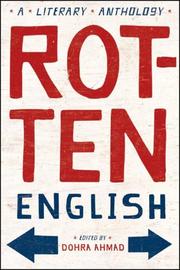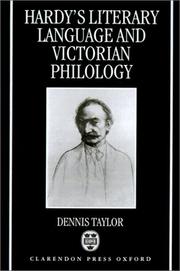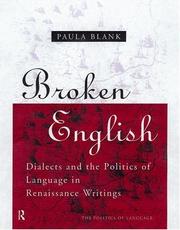| Listing 1 - 10 of 17 | << page >> |
Sort by
|
Book
Year: 1967 Publisher: Lund : Gleerup,
Abstract | Keywords | Export | Availability | Bookmark
 Loading...
Loading...Choose an application
- Reference Manager
- EndNote
- RefWorks (Direct export to RefWorks)
Book
ISBN: 147449076X 1474442579 Year: 2022 Publisher: Edinburgh : Edinburgh University Press,
Abstract | Keywords | Export | Availability | Bookmark
 Loading...
Loading...Choose an application
- Reference Manager
- EndNote
- RefWorks (Direct export to RefWorks)
Analysing examples from 18th century literary texts through to 21st century social media, this is the first comprehensive collection to explore dialect writing in the North of England. The book also considers broad questions about dialect writing in general: What is it? Who does it? What types of dialect writing exist? How can linguists interpret it? Bringing together a wide range of contributors, the book investigates everything from the cultural positioning and impact of dialect writing to the mechanics of how authors produce dialect spellings (and what this can tell us about the structure of the dialects represented).
English language --- Dialect literature, English --- Dialects

ISBN: 9780393329605 Year: 2007 Publisher: New York ; London : W.W Norton,
Abstract | Keywords | Export | Availability | Bookmark
 Loading...
Loading...Choose an application
- Reference Manager
- EndNote
- RefWorks (Direct export to RefWorks)
A global anthology of fiction and poetry in vernacular English. Rotten English spans the globe to offer an overview of the best non-standard English writing of the past two centuries, with a focus on the most recent decades. What would once have been derogatorily termed "dialect literature" has come into its own in a language known variously as slang, creole, patois, pidgin, or, in the words of Nigerian novelist Ken Saro-Wiwa, "rotten English." The first anthology of its kind, Rotten English celebrates vernacular literature from around the English-speaking world, from Robert Burns, Mark Twain, and Zora Neale Hurston to Roddy Doyle, Jonathan Safran Foer, and M. NourbeSe Philip. With concise introductions that explain the context and aesthetics of the vernacular tradition, this anthology pays tribute to the changes English has undergone as it has become a global language.
English literature. --- Dialect literature, English. --- English-speaking countries
Book
ISBN: 9780391035621 0391035622 Year: 1988 Publisher: Atlantic Highlands (N.J.): Humanities press,
Abstract | Keywords | Export | Availability | Bookmark
 Loading...
Loading...Choose an application
- Reference Manager
- EndNote
- RefWorks (Direct export to RefWorks)
English language --- Speech in literature --- Characters and characteristics in literature --- Dialect literature, English --- Dialogue --- English fiction
Book
ISBN: 0674029534 Year: 2005 Publisher: Cambridge, Massachusetts ; London, England : Harvard University Press,
Abstract | Keywords | Export | Availability | Bookmark
 Loading...
Loading...Choose an application
- Reference Manager
- EndNote
- RefWorks (Direct export to RefWorks)
With increasing frequency, readers of literature are encountering barely intelligible, sometimes unrecognizable languages created by combining one or more languages with English. Evelyn Ch'ien argues that weird English constitutes the new language of literature, implicitly launching a new literary theory. Weird English explores experimental and unorthodox uses of English by multilingual writers traveling from the canonical works of Nabokov and Hong Kingston to the less critiqued linguistic terrain of Junot DÃÂaz and Arundhati Roy. It examines the syntactic and grammatical innovations of these authors, who use English to convey their ambivalence toward or enthusiasm for English or their political motivations for altering its rules. Ch'ien looks at how the collision of other languages with English invigorated and propelled the evolution of language in the twentieth century and beyond. Ch'ien defines the allure and tactical features of a new writerly genre, even as she herself writes with a sassiness and verve that communicates her ideas with great panache. Table of Contents: Introduction 1. A Shuttlecock above the Atlantic: Nabokov's Mid-Life and Mid-Geographic Crises 2. Chinky Writing 3. The Politics of Design: Arundhati Roy 4. "The Shit That's Other": Unintelligible Languages 5. Losing Our English, Losing Our Language: The Unintelligibility of Postcolonial Theory Notes Index Reviews of this book: Nien-Ming Ch'ien makes a sophisticated theoretical argument by proposing that with the rise of world literatures in English, readers are encountering barely intelligible and sometimes unrecognizable English resulting from a combination of one or more languages with English. She terms this combination 'weird English'.Examining the works of such multicultural writers as Vladimir Nabokov, Maxine Hong Kingston, and Arundhati Roy, [she] posits that weird English obliterates the boundary between the sacred and the profane in language and demands a new literary theory.[Ch'ien's] somewhat unorthodox and vivacious style perfectly complements her argument.--Aparna Zambare, Library JournalEvelyn Ch'ien's Weird English offers up an innovative, risk-taking, colorful, richly textualized, and important new text which refigures our tired, familiar, or overly-representative notions of the "global postcolonial" or "US ethnic" text as literary and cultural-political event. Ch'ien's scholarly text is offbeat yet on the social aesthetic mark in a way that has never quite been done before. Weird English posits and defines the allure and tactical features of a whole new writerly genre based and rooted in the minority deformations of British and American English. Activating what she talks about as the newness, stigmata, and social struggle to achieve freedom and respect of writing in this emerging new genre she calls "weird English," Ch'ien herself writes/performs like some scholarly cross between Helen Vendler and Margaret Cho: everywhere mixing the prosodic insight and sensitivity to linguistic close-readings and aesthetic valences of the former, say, with all the sassiness, adventure, and in-your-face verve and minority-rooted freshness of the latter. "Insouciance" of language and attitude is both Ch'ien's subject and, at times, her style, as scholarship swerves into polemic, probe, joke, song, and the social energies of mongrel mixture. Her unprecedented writing on Junot Diaz is especially fine and visceral, close to the inner-American grain of its ghetto life and linguistic-social emergences, and thus grants his Spanglish a new world company and genre. Like some homegrown Deleuze, Ch'ien comes close to, articulates, and thus activates the "minority becoming" of Diaz's writing showing how the Diaz mixed-minority language is seeped in social utterance and subaltern energies, without writing them out of existence or abstracting them via the routine distances of postcolonial theory (which she later bravely and even recklessly admonished for its opaque sublimations of such social forces). In cumulative effect, then, Weird English comprises not so much a direct hit upon the US minority field-imagery as an end-run around and through its over-determined political anguish, racial melancholy, and will-to-be-canonical concerns of Asian American studies as ethnic or subaltern mission.--Rob Wilson, author of Re-Imagining the American Pacific and American Sublime
Book
ISBN: 131715147X 1315576953 Year: 2017 Publisher: London ; New York : Routledge,
Abstract | Keywords | Export | Availability | Bookmark
 Loading...
Loading...Choose an application
- Reference Manager
- EndNote
- RefWorks (Direct export to RefWorks)

ISBN: 0198122616 Year: 2001 Publisher: Oxford : Clarendon Press,
Abstract | Keywords | Export | Availability | Bookmark
 Loading...
Loading...Choose an application
- Reference Manager
- EndNote
- RefWorks (Direct export to RefWorks)
Dialect literature, English --- English language --- English language --- English literature. --- English philology --- Language and culture --- Style, Literary. --- History and criticism. --- Lexicography --- Style --- History --- History --- Hardy, Thomas,
Book
Year: 1980 Volume: 55 Publisher: Salzburg : Institut für Anglistik und Amerikanistik, Universität Salzburg,
Abstract | Keywords | Export | Availability | Bookmark
 Loading...
Loading...Choose an application
- Reference Manager
- EndNote
- RefWorks (Direct export to RefWorks)
Dialect literature, English --- Drama --- English language --- English language --- Théâtre (Genre littéraire) --- Anglais (Langue) --- History and criticism --- Technique --- Dialects --- Spoken English --- Technique --- Dialectes --- Synge, J. M. --- Style.
Book
ISBN: 058255036X 0582550378 9780582550360 9780582550377 Year: 1973 Volume: 8 Publisher: Harlow : Longman,
Abstract | Keywords | Export | Availability | Bookmark
 Loading...
Loading...Choose an application
- Reference Manager
- EndNote
- RefWorks (Direct export to RefWorks)
English fiction --- Speech in literature --- Dialect literature, English --- Characters and characteristics in literature --- Oral communication in literature --- English language --- Dialogue --- History and criticism --- Style --- Characters and characteristics in literature. --- -Dialogue --- -English language --- -Speech in literature --- Germanic languages --- English literature --- Dialog --- Drama --- English dialect literature --- Character sketches --- Characterization (Literature) --- Literary characters --- Literary portraits --- Portraits, Literary --- Dialogue. --- Oral communication in literature. --- Speech in literature. --- History and criticism. --- Style. --- English fiction - History and criticism --- Dialect literature, English - History and criticism --- English language - Great Britain - Style

ISBN: 0415137799 0415756847 0585448027 0203437357 1134774737 1280110015 1134774729 9780415137799 Year: 1996 Publisher: London ; New York, NY : Routledge,
Abstract | Keywords | Export | Availability | Bookmark
 Loading...
Loading...Choose an application
- Reference Manager
- EndNote
- RefWorks (Direct export to RefWorks)
The English language in the Renaissance was in many ways a collection of competing Englishes. Blank investigates the representation of alternative vernaculars in both linguistic and literary works of the time.
Dialect literature, English --- Language and languages --- Renaissance --- English language --- English literature --- Language and culture --- History and criticism --- Political aspects --- History --- Variation --- Dialect literature, English. --- English language. --- English language - Early modern, 1500-1700. --- English literature. --- Language and culture. --- Language and languages. --- Renaissance. --- English Language --- English --- Languages & Literatures --- Dialect literature, English - History and criticism --- Language and languages - Political aspects - England - History - 16th century --- Renaissance - England --- English language - Early modern, 1500-1700 --- English language - Variation - England - History - 16th century --- English literature - Early modern, 1500-1700 - History and criticism --- Language and culture - England - History - 16th century --- Language and culture - England - History - 17th century --- ANGLAIS (LANGUE) --- LITTERATURE ANGLAISE --- LANGAGE ET LANGUES --- LANGAGE ET CULTURE --- 1500-1700 (MODERNE) --- HISTOIRE ET CRITIQUE --- ASPECT POLITIQUE --- GRANDE-BRETAGNE --- EVOLUTION --- Langues --- Aspect politique
| Listing 1 - 10 of 17 | << page >> |
Sort by
|

 Search
Search Feedback
Feedback About UniCat
About UniCat  Help
Help News
News